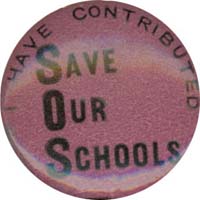
introduction
Since the September 11, 2001 attacks and the passage of the U.S.A. Patriot
Act, the actions of the federal government to monitor the activities of
university-based faculty and students have raised public concern about academic
freedom and free speech on college campuses. Americans are actively debating
how best to exercise our cherished civil liberties and rights during a period
of national crisis. This exhibit describes a series of events that took
place at the City College of New York (the oldest of all CUNY colleges)
during the 1930s and early 1940s that posed similar challenges to notions
of academic freedom and civil liberties.
Student and faculty political activism at City College during the Great
Depression was widespread. CCNY students throughout the 1930s participated
in protests against militarism, social and economic injustice at home and
the threat of fascism abroad. They also fought to defend free speech on
their campus. City College faculty also participated in anti-fascist organizations
and formed the College Teachers Union (a predecessor of today’s faculty
union); they also established a City College unit of the U.S. Communist
Party. Mainstream newspapers at the time, opposed to such campus-based activism,
labeled City College “The Little Red School House.”
The City College administration, the New York City Board of Higher Education,
and outside political forces in New York State attempted to silence this
campus activism. Students were suspended or expelled and their organizations
and publications banned. Faculty members were denied reappointment, and
those who refused to cooperate with the Rapp-Coudert Committee (1940-42)--a
New York state legislative committee created to investigate “Communist
subversion” in the city’s public schools and colleges--were
ultimately dismissed from their jobs.
CLICK HERE FOR INSTRUCTIONS ON HOW TO USE THIS SITE!







